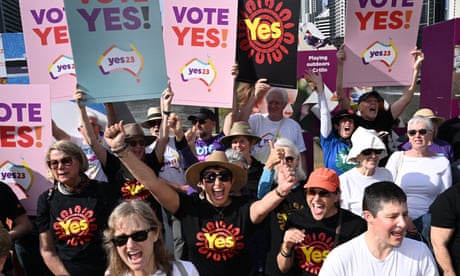‘Time to be fearless’: NT attorney general urges Australian leaders to pursue treaty after voice defeat
Chansey Paech says the Uluru statement is ‘not finished’ despite the result of the Voice referendum.

The Northern Territory’s attorney general is urging the nation’s leaders to put last year’s voice referendum result behind them and move to forge treaties with Indigenous people because “the time for sorry business is over”.
The attorney general and deputy chief minister, Chansey Paech, is urging the prime minister, Anthony Albanese, and state and territory colleagues not to allow the referendum result to stall progress on the other elements of the Uluru statement from the heart.
“To all other Australian jurisdictions and the commonwealth – don’t be afraid,” Paech, an Arrente, Arabana and Gurindji man from Alice Springs, said on Thursday. “This is the time to be fearless and do what’s right.”
The NT government resumed its treaty process this week, holding its annual Indigenous Leadership and Governance forum in Alice Springs on Thursday – the first since October’s referendum defeat – ahead of a one-day treaty symposium there on Friday and another in Darwin scheduled for Monday.
In mid-2022, the NT’s treaty commission produced a report recommending the four land councils be consulted on a draft Indigenous self-government bill and “treaty and truth” commission as forerunners to treaties themselves.

But later that year, the NT Labor government paused so people were not confused by overlapping treaty and referendum processes. Now, Paech says governments must get on with it.
“Where we’re left now is an opportunity,” he said. “I think it’s time for the referendum sorry business to be over and for us to really look at the other aspects of the Uluru statement from the heart, and that was Makarrata, or treaty and truth telling.”
Calling the referendum result “unfortunate”, Paech said it provided an opportunity for supporters of constitutional change to reflect and “harness that as fuel, so that we can learn from that and that we don’t see the same defeat in the other aspects of the Uluru statement”. He said Indigenous people must keep fighting for change.
“We have to get up, dust ourselves off, and really, get back to work on truth telling and treaty,” he said. “The Uluru statement is not finished. The referendum was one aspect of three pillars, and we owe it to ourselves, we owe it to our communities, we owe it to our ancestors to absolutely keep pushing to have the recognition and to have … a greater say and impact on issues that affect us as Aboriginal and Torres Strait Islander people.”
He challenged political leaders to overcome political “nervousness” about progressing treaty and truth.
“We absolutely have to be fearless on this because this is an opportunity to change the landscape and empower people,” Paech said. “So I think people need to get over their concern for their own political careers and do what’s right.”
NT voters will go to the polls in August and the treaty proposal is a point of difference between Labor and the Country Liberal party, which opposes it. Paech said if re-elected, he hoped to finalise a treaty or treaties within the next term of government.
